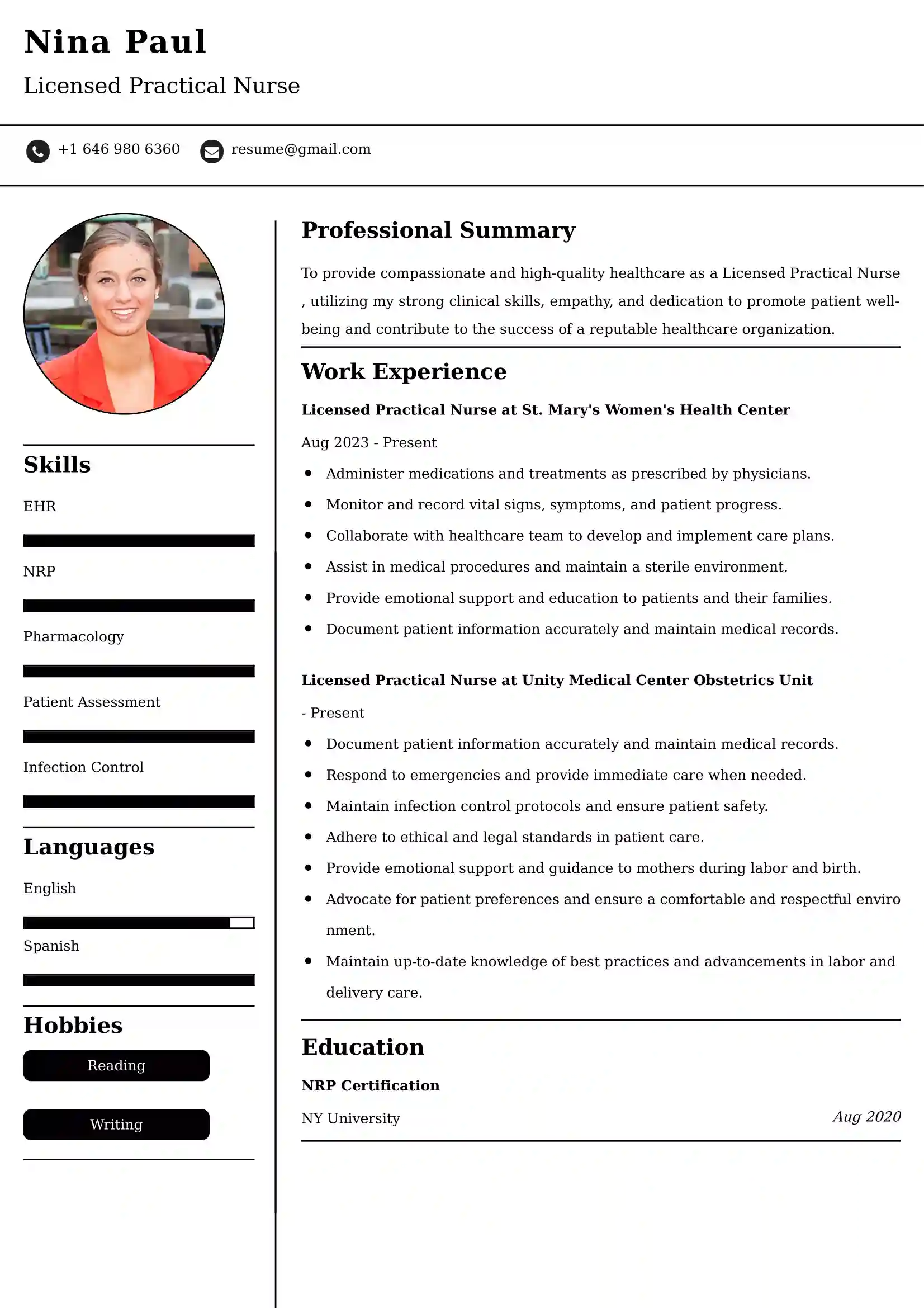Resume
Resume examples for top Lpn jobs
Use the following guidelines and resume examples to choose the best resume format.
Lpn Resume Example

About Licensed Practical Nurse (LPN) Resumes
Are you considering a career as a Licensed Practical Nurse (LPN), providing essential nursing care and support to patients in various healthcare settings? Crafting an effective resume is your essential first step toward achieving success in this vital and hands-on nursing role. Your resume serves as your professional introduction to potential employers, showcasing your qualifications and expertise in patient care, medication administration, and healthcare teamwork. To assist you in creating an impactful LPN resume, we provide resume examples, salary details in INR, key skills, dos and don'ts, frequently asked questions (FAQs), and a brief overview of this role.
Salary Details (INR)
In the nursing field in India, salaries for Licensed Practical Nurses (LPNs) can vary based on factors such as experience, location, and the healthcare facility. On average, LPNs can expect to earn anywhere from INR 2 lakhs to INR 6 lakhs or more per annum. However, these figures may fluctuate significantly based on individual circumstances and the specific demands of LPN roles in healthcare.
Key Skills for LPN Resumes
When crafting your LPN resume, it's essential to emphasize specific key skills that are highly valued in this role. These may include:
- Patient Care: Showcase your expertise in providing direct patient care, including vital sign monitoring, wound care, and administering prescribed treatments.
- Medication Administration: Highlight your competence in safely administering medications, following medication schedules, and monitoring patient responses.
- Documentation: Emphasize your attention to detail in maintaining accurate patient records and documenting care plans and interventions.
- Communication: Mention your ability to communicate effectively with patients, families, and healthcare teams to ensure coordinated care.
- Team Collaboration: Showcase your capacity to work collaboratively with nurses, physicians, and other healthcare professionals to provide comprehensive patient care.
Do's and Don'ts for LPN Resumes
Do's:
- Customize Your Resume: Tailor your resume for each specific job application, emphasizing your relevant qualifications and LPN experiences.
- Highlight Achievements: Focus on your accomplishments, such as positive patient outcomes, contributions to care teams, and adherence to safety protocols.
- Use Action Verbs: Start bullet points in your work experience section with strong action verbs to describe your responsibilities and achievements more vividly.
- Include Certifications: Mention any relevant certifications, such as LPN licensure or Basic Life Support (BLS) certification, to demonstrate your qualifications.
- Quantify Achievements: Whenever possible, use quantifiable metrics to demonstrate your impact, such as the number of patients cared for or reductions in medication errors.
Don'ts:
- Neglect Proofreading: Carefully proofread your resume to eliminate typos, grammatical errors, and formatting issues.
- Overload with Medical Jargon: Avoid using excessive medical terminology that may be challenging for non-medical readers, including HR professionals.
- Exaggerate or Misrepresent Information: Always be truthful about your qualifications and experiences.
- Omit Continuing Education: If you've completed any relevant courses or workshops, include them in your resume to demonstrate your commitment to professional development.
- Provide References on the Resume: It's not necessary to include references on the resume. Provide them separately when requested by the employer.
Frequently Asked Questions (FAQs) on Resume Format for LPNs
- Is it essential to include a summary or objective statement on my LPN resume?
- A well-crafted summary statement can provide context and highlight your commitment to nursing, but it's optional.
- Should I list my educational background and certifications on my resume?
- Yes, prominently feature your relevant educational qualifications and certifications to demonstrate your expertise.
- Is it necessary to list personal interests or hobbies on my resume?
- While not obligatory, including relevant hobbies or interests can provide insights into your personality.
- How can I demonstrate my commitment to patient-centered care on my resume?
- Mention specific instances where you provided compassionate care, communicated effectively with patients and families, and contributed to positive patient outcomes in your work experience section.
- Should I include references on the resume?
- Typically, references are not included on the resume. Provide them separately when requested by the employer.
More Resume Examples for the Next Step in Your Lpn Resume Career jobs
- Acute Care Nurse Resume
- Advanced Practice Rn Resume
- Caregiver Resume
- Er Nurse Resume
- Geriatric Nurse Practitioner Resume
- Labor And Delivery Nurse Resume
- Lpn Resume
- Nurse Practitioner Resume
- Nursing Assistant Resume
- Oncology Nurse Resume
- Pediatric Nurse Resume
- Registered Nurse Resume
- Public School Nurse Resume
- Trauma Nurse Resume
More Cover Examples for the Next Step in Your Lpn Cover Career jobs
- Acute Care Nurse Cover Letter
- Advanced Practice Rn Cover Letter
- Caregiver Cover Letter
- Chief Nursing Officer Cover Letter
- Er Nurse Cover Letter
- Geriatric Nurse Practitioner Cover Letter
- Labor And Delivery Nurse Cover Letter
- Lpn Cover Letter
- Nurse Practitioner Cover Letter
- Nursing Assistant Cover Letter
- Oncology Nurse Cover Letter
- Pediatric Nurse Cover Letter
- Registered Nurse Cover Letter
- Public School Nurse Cover Letter
- Trauma Nurse Cover Letter
Get started with a winning resume template
800+ Resume Samples in ATS Format, HR Approved for Your Success
Step into the world of resume excellence with our comprehensive collection of 800+ samples, meticulously designed in ATS-friendly format and rigorously approved by HR professionals. Your path to success starts here as you craft a resume that effortlessly navigates through automated systems and captures the attention of hiring experts. Explore now and take the first step towards landing your dream job.
Resume Examples
What clients say about us
Our Resume Are Shortlisted By










